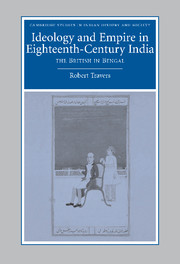Book contents
- Frontmatter
- Contents
- Preface and acknowledgements
- Abbreviations and note on currency
- Glossary of Indian terms
- Map of Bengal and Bihar in the Eighteenth-Century
- Introduction
- 1 Imperium in imperio: the East India Company, the British empire and the revolutions in Bengal, 1757–1772
- 2 Colonial encounters and the crisis in Bengal, 1765–1772
- 3 Warren Hastings and ‘the legal forms of Mogul government’, 1772–1774
- 4 Philip Francis and the ‘country government’
- 5 Sovereignty, custom and natural law: the Calcutta Supreme Court, 1774–1781
- 6 Reconstituting empire, c. 1780–1793
- 7 Epilogue
- Bibliography
- Index
- Cambridge Studies in Indian History and Society
4 - Philip Francis and the ‘country government’
Published online by Cambridge University Press: 18 July 2009
- Frontmatter
- Contents
- Preface and acknowledgements
- Abbreviations and note on currency
- Glossary of Indian terms
- Map of Bengal and Bihar in the Eighteenth-Century
- Introduction
- 1 Imperium in imperio: the East India Company, the British empire and the revolutions in Bengal, 1757–1772
- 2 Colonial encounters and the crisis in Bengal, 1765–1772
- 3 Warren Hastings and ‘the legal forms of Mogul government’, 1772–1774
- 4 Philip Francis and the ‘country government’
- 5 Sovereignty, custom and natural law: the Calcutta Supreme Court, 1774–1781
- 6 Reconstituting empire, c. 1780–1793
- 7 Epilogue
- Bibliography
- Index
- Cambridge Studies in Indian History and Society
Summary
Around the year 1757, a Turkish man, born in Constantinople, educated in Paris, and a former servant of the French East India Company in south India, boarded an English ship in Bombay. This Turk, variously known as Mustafa or Monsieur Raymond, quickly made friends with the English captain of the ship, a Mr Ranier. Mustafa described Ranier as possessing a ‘general benevolence for mankind’, and an ‘uprightness’, virtues that soon seemed to him to be ‘characteristical in the English’. Captain Ranier and Mustafa became friends, partly because, in Mustafa's own words, ‘I had learned his tongue with a rapidity that amazed us both’;
with a mediocre dictionary and a bad grammar, I learned enough of English in the nineteen days from Bombay to Balassor, as to delight in Bolingbroke's philosophical works. The English itself is no ways Difficult, and to a man already master of some Latin and French it is a very easy acquisition.
The story of a French-educated Turk, on an English ship in the Indian ocean, reading one of the pre-eminent political philosophers of eighteenth-century Britain is a vivid illustration of the dizzying transpositions involved in the expansion of British power in Asia. Mustafa stayed in Bengal, and made a fitful career out of service to high-ranking officers of the English East India Company as they laid the foundations of the British empire in India.
- Type
- Chapter
- Information
- Ideology and Empire in Eighteenth-Century IndiaThe British in Bengal, pp. 141 - 180Publisher: Cambridge University PressPrint publication year: 2007



